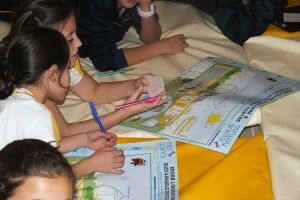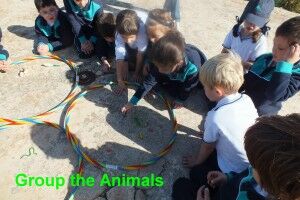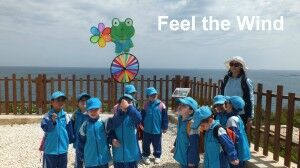Education for Sustainable Development
Introduction
Nature Trust – FEE Malta strongly believes in Education for Sustainable Development as a means to

raise awareness and pave the way for a better environmental future . the organisation dedicates a
big percentage of its budgets towards promoting ESD. With the organisation becoming a representative of the international organisation Foundation for Environmental Education – ESD has now been put on a higher level in the NGO objectives
NTM’s Approach to Environmental Education
A network of educational methodologies and media
Nature Trust is particularly active in environmental education through diverse methodologies and media, namely, nature visits, campaigning,  production of publications and the programmes EkoSkola, YRE (Young Reporters for the Environment) and LEAF (Educating About Forests). The first three focus on information and raising awareness, while programmes like EkoSkola are process-based so that they function to develop skills through active democratic participation encouraged by the EkoSkola seven steps process (refer to www.ekoskolamalta.org), that targets change of lifestyles.
production of publications and the programmes EkoSkola, YRE (Young Reporters for the Environment) and LEAF (Educating About Forests). The first three focus on information and raising awareness, while programmes like EkoSkola are process-based so that they function to develop skills through active democratic participation encouraged by the EkoSkola seven steps process (refer to www.ekoskolamalta.org), that targets change of lifestyles.
Awareness-raising and action-oriented approaches
Throughout the years, we became aware of wastage of materials, water and energy and these themes started featuring in NTM’s environmental activism. The concept of education for sustainable development (ESD) has, therefore, been gradually introduced as NTM moves along the direction followed by the rest of the world. All the educational methodologies and media put to work by NTM compliment each other. For instance, nature visits are a backdrop to ESD because, during such excursions, individuals and groups have the opportunity to relate to nature and acquire a sense of belonging to it. When nature is no longer visualised as something separate from us, but rather we are part of it and, in turn, it is essential for humans survival, we are more open to change our habits towards ones which care for ecology and the biosphere as a whole. Measures to conserve materials, water and energy become acceptable compromises. Nature visits and other awareness raising media, therefore, fit like a lock and key in the action oriented educational programmes like EkoSkola that, as a methodology, targets empowerment within its domain. The process takes the participants through a journey towards empowerment. Thus, they become active agents of change by gradually transforming into the role model individuals and communities leading by example.
Values education
Throughout this development, the aim has remained the same, that of instilling respect. The first impression might be that environmental  education is after respect towards nature. However, probing deeper, one realises that it targets respect towards oneself, other people, other species, the ecology and the biosphere as a whole. It is about altruism defeating egoism within these widening spheres.
education is after respect towards nature. However, probing deeper, one realises that it targets respect towards oneself, other people, other species, the ecology and the biosphere as a whole. It is about altruism defeating egoism within these widening spheres.
A focus on each educational medium and methodology
NTM’s Outdoor Provision Programme (OPP) for ESD
NTM has always been dedicated to advocate the relevance of wilderness for its intrinsic value and gradually also for human’s well-being and survival. Provision of nature visits was initially limited to its members. The audience targeted widened throughout the years. With the establishment of Wied Ghollieqa Nature Reserve, this commitment was renewed in the sphere of formal education by providing guided walks and interactive activities in this reserve. Along the years, NTM widened its outdoor activities opportunities by including other sites. The opening of Xrobb l-Ghagin Nature Park and Centre for Sustainable Development in April 2011 was another breakthrough in this direction.
NTM’s OPP makes use of the outdoors as a resource, a subject, and as a backdrop for ESD. This emphasis on site visits is perfectly in harmony  with NTMs vision of ESD whereby ecological sustainability is held as the widest sphere that supports the smaller sphere of society and its economy (for a diagrammatic representation of NTM’s vision of ESD refer to the article “NTM and Education – an academic perspective” on this page).
with NTMs vision of ESD whereby ecological sustainability is held as the widest sphere that supports the smaller sphere of society and its economy (for a diagrammatic representation of NTM’s vision of ESD refer to the article “NTM and Education – an academic perspective” on this page).
Typically NTM offers nature experience opportunities to Wied Ghollieqa, Xrobb l-Ghagin, Buskett, Bahrija and Comino amongst other sites. For updated details of the current OPP contact us on [email protected].
ESD
Education for Sustainable Development (ESD) departs from traditional nature studies by seeing the human environment as intricately related to the natural environment. The participatory teaching and learning methods adopted are aimed at triggering action that departs from the one-off sporadic activities of traditional campaigning. It aims at empowering individuals and communities to become agents of change to achieve the well-being of the human race without compromising that of future generations. It applies holistic approaches to target the environmental, economic and social well-being of the human race and the whole planet.
Nature Trust (Malta) (NTM) runs several programmes of the FEE (Foundation for Environmental Education) of whom it is the national representative, and runs an ESD programme at Xrobb l-Għaġin Park and Sustainable Development Centre. All programmes adopt methodologies that offer opportunities to develop knowledge, skills, attitudes and values that develop an aptitude for change in individual and community practices that leave no harm which cannot be recovered in the present or in the future. This is possible because NTM’s programmes promote competencies like critical thinking, imagining future scenarios and actively participating in decision-making.
The SD themes approached through NTM-ESD programmes include waste management, water and energy harvesting, land and marine biodiversity and ecology, amongst others, in the local and global contexts. Key SD matters such as climate change, poverty reductions and consumer responsibilities feature high on the agenda of both the FEE programmes and ESD at Xrobb l-Għaġin.
The FEE programmes run by NTM are EkoSkola (www.ekoskola.org.mt/), Young Reporters for the Environment(YRE) and PressKids (www.yremalta.org/), Learning About Forests (www.leafmalta.org/), Green Key (site under construction) and Blue Flag (www.blueflagmalta.org/). Further details on ESD development at Xrobb l-Għaġin is available at http://www.xrobblghagin.org.mt/educational-visits-services/ . Updates are also available on social media portals for NTM and the specific programmes, for instance, https://www.facebook.com/xrobblghaginparkNTM?ref=bookmarks.
For updated details on each campaign contact us on [email protected]
Publications
NTM produces a range of publications and printed material for diverse ages and levels of interest. These include the scientific “Central Mediterranean Naturalist”, the non-scientific “Archipelago” and “Il-Ballottra”, the latter being in Maltese and targeting mainly school children. Other publications include booklets about Id-Dwejra, Il-Majjistral and Xrobb l-Ghagin parks. NTMs repertoire includes story and colouring books for primary school children.
The “Archipelago” series deals with a site of interest per issue. It includes articles about ecology, geology and history of the sites. The “Il-Ballottra” series includes articles, stories, games and competitions that cover a wide range of environmental issues from ecology to resource conservation and renewable energy resources to historical aspects of the islands’ heritage. It features characters like Lumina and the frog Kolombu.
NTM’s publications are sent for free to NTM’s paying members and can be bought by contacting us on [email protected].
EkoSkola, YRE and LEAF programmes
All the details about and of each of these programmes can be found in the following links: www.ekoskolamalta.org, www.yremalta.org, www.leafmalta.org.
Conclusion
The education movement described above is the result of years of active volunteering. NTM welcomes anyone who wishes to contribute in its environmental education ventures and their continuous, gradual development.






